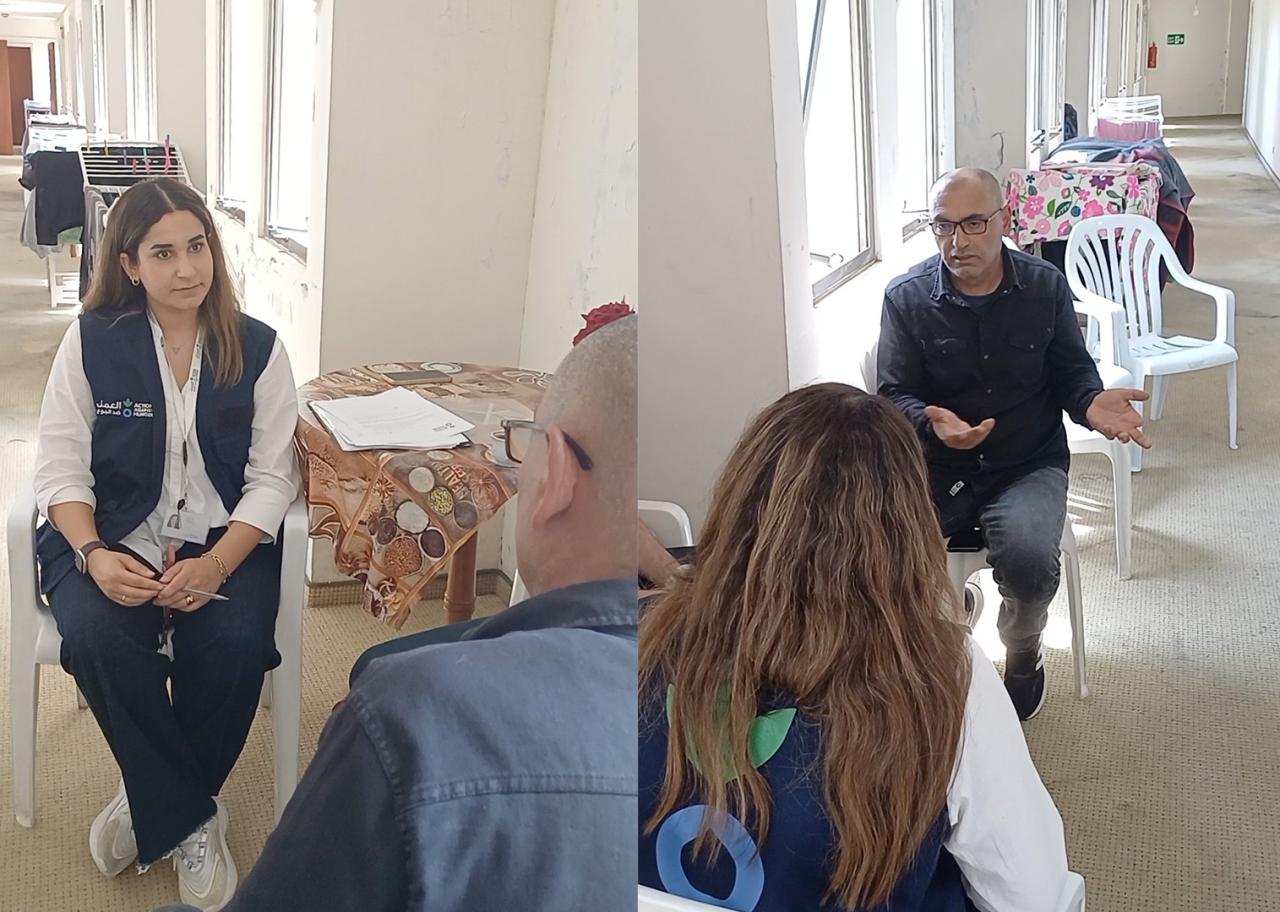Mahmoud's Story of Displacement and Resilience in South Lebanon
NORTHAMPTON, MA / ACCESS Newswire / August 28, 2025 / Action Against Hunger
Published by Action Against Hunger.
Contact media@actionagainsthunger.org for inquiries.
A Shelter Becomes a Lifeline
Mahmoud and his son were among the first to arrive at the Montana Collective Shelter the day after it opened its doors in December 2023. The former hotel in Marwanieh, southern Lebanon, quickly became a lifeline for families displaced by conflict. It was the region's first collective shelter, and it is now the largest, providing safety to nearly one hundred families with nowhere else to turn.
Since the day he moved into the shelter, Mahmoud has been determined to do everything he can to help his fellow residents. He starts his days at 6:30 a.m. and works until midnight, building furniture such as sinks, storage bins, bookcases for any family who asks.
Before the shelter, Mahmoud and his family lived in Odeisseh, a town close to the border in the south of Lebanon. Their lives were permanently changed after an escalation of violence in 2023, in which their area was especially hard hit. After enduring 65 days of insecurity, they were finally forced to leave. Mahmoud's wife and daughter went to Tyre while Mahmoud moved with his son to the Montana Hotel and set up one of the rooms for the family to live in. Fifteen long days passed, in which Mahmoud felt that they "lived in other countries, very far from each other, since the only communications we could have were by phone." They were relieved to be reunited, even though their room in the Montana Collective Shelter was small, and the family had to share one bed.
Mahmoud's family was not alone. According to OCHA, nearly 850,000 people were displaced in October 2023 due to an escalation of violence. In the beginning, families thought the displacement would be temporary: "We didn't expect the conflict to last forever, so we didn't bring a lot of things with us," recalls Mahmoud. Instead, they remained unable to return home, facing a relentless rise in instability and the cost of living. Food inflation reached 208% by December 2023, as reported by the Food Security Cluster. At that time, families "needed everything," according to Mahmoud.
Action Against Hunger activated an Emergency Relief Response to support the Montana Collective Shelter, providing:
Food packages
Hot meals
Hygiene kits
Mattresses
Pillows and blankets
Fuel for cooking and heat
Building materials
More than a year and a half since leaving home, Mahmoud's family is still residing in the shelter. With Action Against Hunger's support, they added two beds to their room, allowing them to live more comfortably. They once tried to return to Odeisseh, but their home had been badly damaged, and the landscape had completely changed. Mahmoud said, "There is no life. There are no plants. There is nothing left."
In addition to damaged land and infrastructure, continued instability keeps over 82,000 people displaced in Lebanon. A July 2025 United Nations report notes that, while a ceasefire was successfully brokered in November 2024, the situation in southern Lebanon remains fragile. The World Health Organization reported a concerning rise in ceasefire violations in June 2025, with hostilities including air activity. Top UN officials in Lebanon called for compliance with the ceasefire at the beginning of this year to enable durable solutions for displaced families.
Action Against Hunger's Ongoing Response
In 2024, Action Against Hunger scaled up emergency support for displaced families in Lebanon. As security conditions remain fragile, our priority is to help communities meet their basic needs while finding long-term solutions to food insecurity and public health challenges.
Action Against Hunger remains responsible for the management of the Montana Collective Shelter. Our work includes infrastructure rehabilitation, aid distribution, and coordination with other organizations on humanitarian responses. We continue to distribute drinking water and hygiene kits. Our mobile medical teams provide medical consultations and services including malnutrition prevention, detection and treatment.
Water, sanitation, and hygiene activities are notably important to the people living in the collective shelter, as there is no safe water available otherwise. During the summer, Mahmoud said that "with the increase in temperatures, we are going to have a very significant water crisis. Action Against Hunger is meeting that need. If humanitarian organizations stopped working here, it would be like leaving us at our mercy in a desert."
***
Action Against Hunger leads the global movement to end hunger. We innovate solutions, advocate for change, and reach 21 million people every year with proven hunger prevention and treatment programs. As a nonprofit that works across over 55 countries, our 8,900 dedicated staff members partner with communities to address the root causes of hunger, including climate change, conflict, inequity, and emergencies. We strive to create a world free from hunger, for everyone, for good.

View additional multimedia and more ESG storytelling from Action Against Hunger on 3blmedia.com.
Contact Info:
Spokesperson: Action Against Hunger
Website: https://www.3blmedia.com/profiles/action-against-hunger
Email: info@3blmedia.com
SOURCE: Action Against Hunger
View the original press release on ACCESS Newswire:
https://www.accessnewswire.com/newsroom/en/business-and-professional-services/finding-safety-at-montana-collective-shelter-1066702
